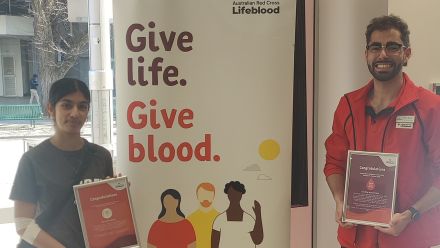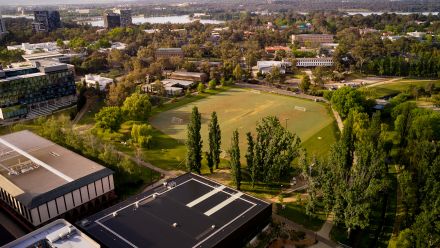Support at the frontiers of science and medicine
There is a revolution taking place in the field of computational biology and The Australian National University is leading the charge, thanks to a generous donation of more than $2.5 million, made by two former students.
Humanity's ability to develop cutting-edge technologies for genomics, imaging, and computational analysis is rapidly changing the face of biomedical research and healthcare forever. Unfortunately, a shortage of skilled researchers with expertise in both biomedical and computational sciences is inhibiting progress.
Loong Wang and Taiyang Zhang, co-founders of the biotech start up Talo, decided to remedy this shortage, with a substantial donation to establish the Talo Computational Biology Talent Accelerator at the John Curtin School of Medical Research.
The Accelerator aims to change how the world thinks about and provides healthcare, by developing the skills and experience needed to bridge the gap between biomedical and computational sciences, through a range of PhD scholarships, research internships, travel grants and innovator grants.
"The volume of biological data that humans are generating has exploded exponentially over the last decade. From individual molecules to entire genomes, we are collecting more data than ever, faster than ever," says Loong.
"But actually making sense of all of this data, using it to diagnose and treat diseases that are currently beyond our reach, is another challenge entirely. I believe it is absolutely necessary for bright people to bring high-performance computing and artificial intelligence to bear on this problem.
"By bridging the gap between computer science and life science, we will forever change millions of lives for the better, and I believe ANU can be a global leader in this space.
"Computational and biomedical science are in the midst of a paradigm shift. Already, computational biology is making major breakthroughs on the spread and development of disease and gene-disease associations, with the potential to save millions of lives worldwide," says Taiyang.
"The Accelerator is supporting the next generation of computational biology professionals to completely change how the world thinks about and provides healthcare."
Professor Eduardo Eyras, Accelerator program lead, and other researchers involved in the Talo Computational Biology Accelerator recognise this as one of the newest and fastest growing fields in science, yet with few training options available.
"With most people coming to the discipline from diverse backgrounds, this program will provide essential interdisciplinary training to advance biomedical research and prepare a new generation of computational biologists," says Professor Eyras.
By directly supporting students and early-career researchers with this ground-breaking program, the Talo Computational Biology Talent Accelerator is investing in people and ideas to completely change the ways in which the world thinks about and provides healthcare.
This impact story is a feature in the 2021 Report to Donors


